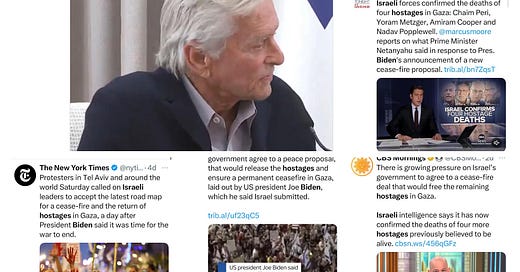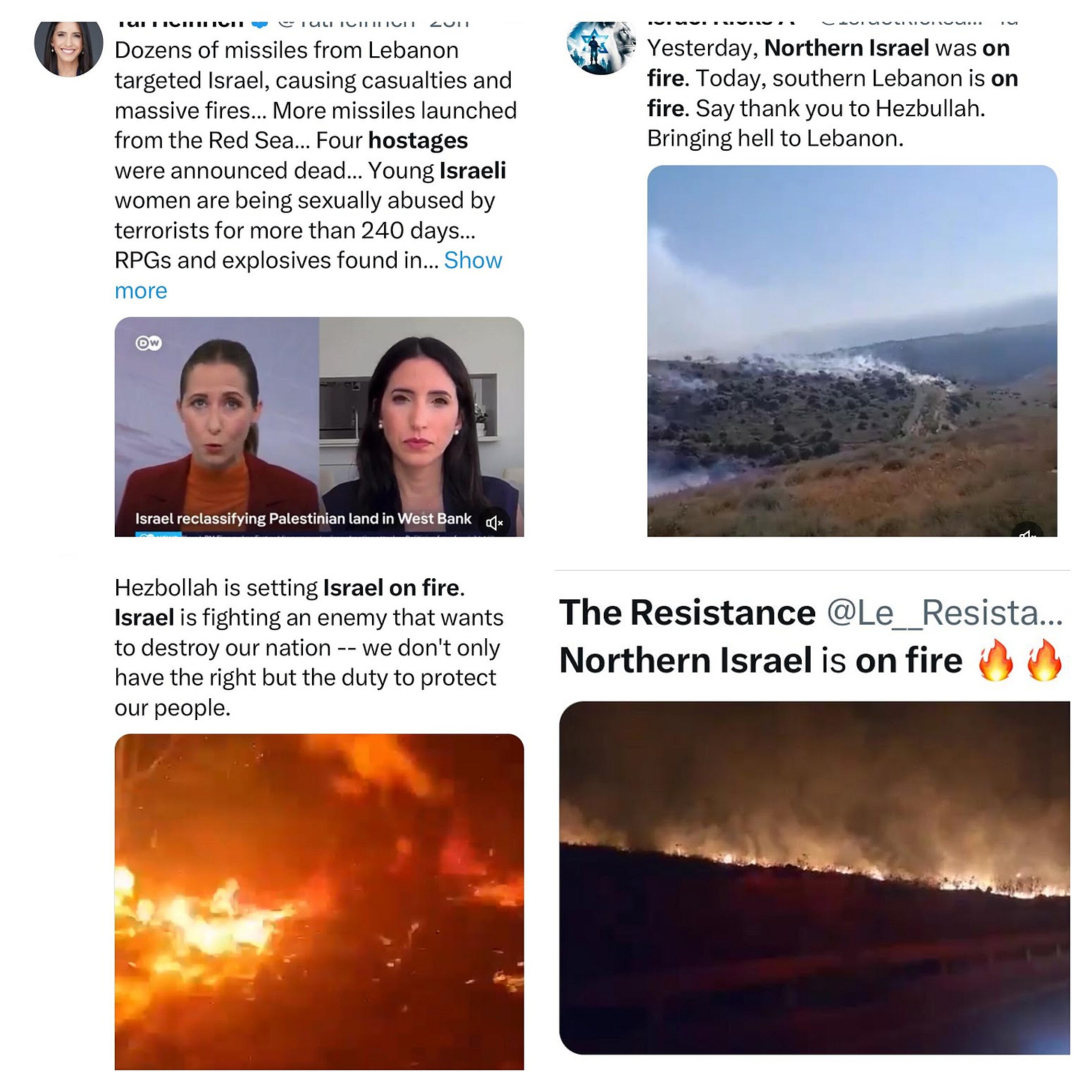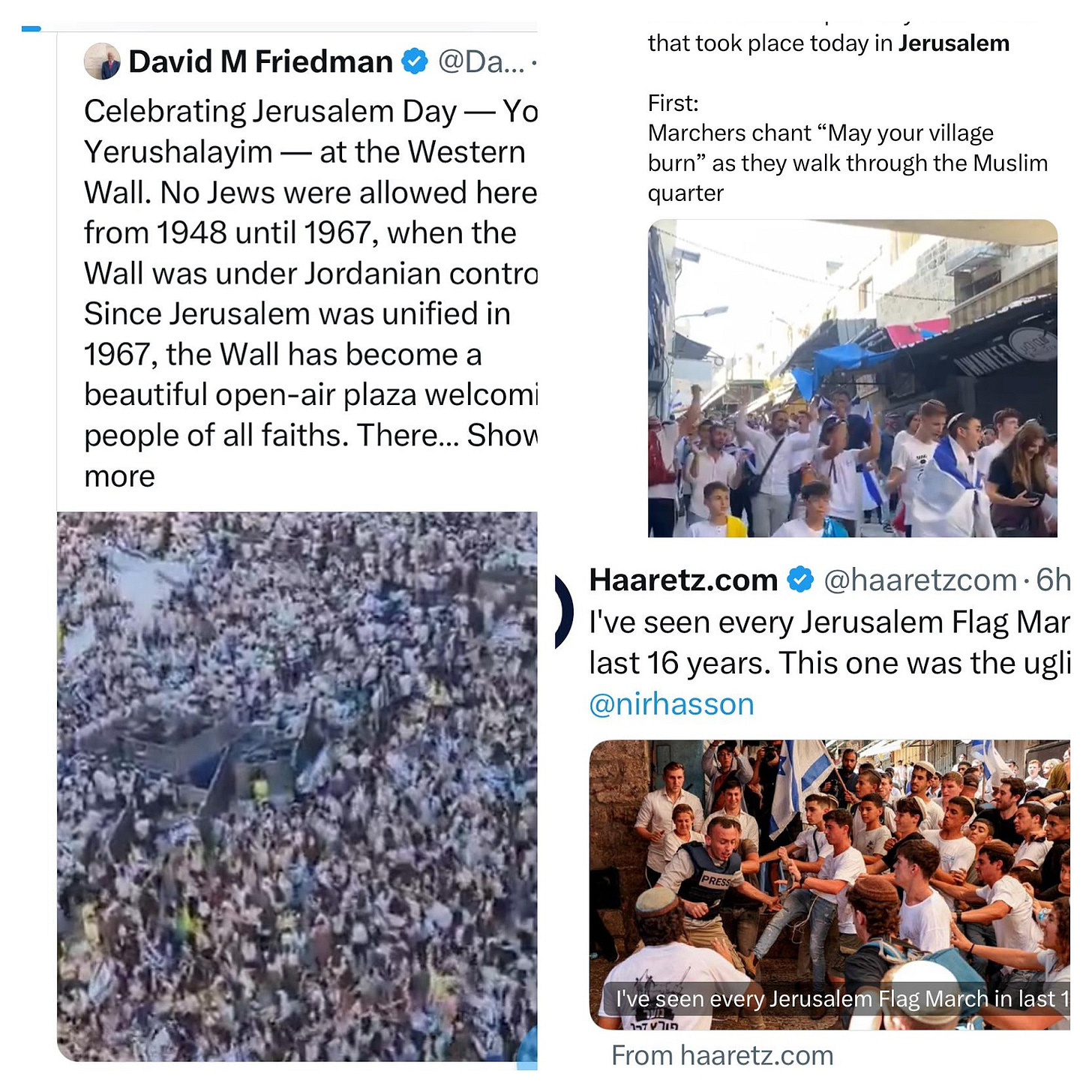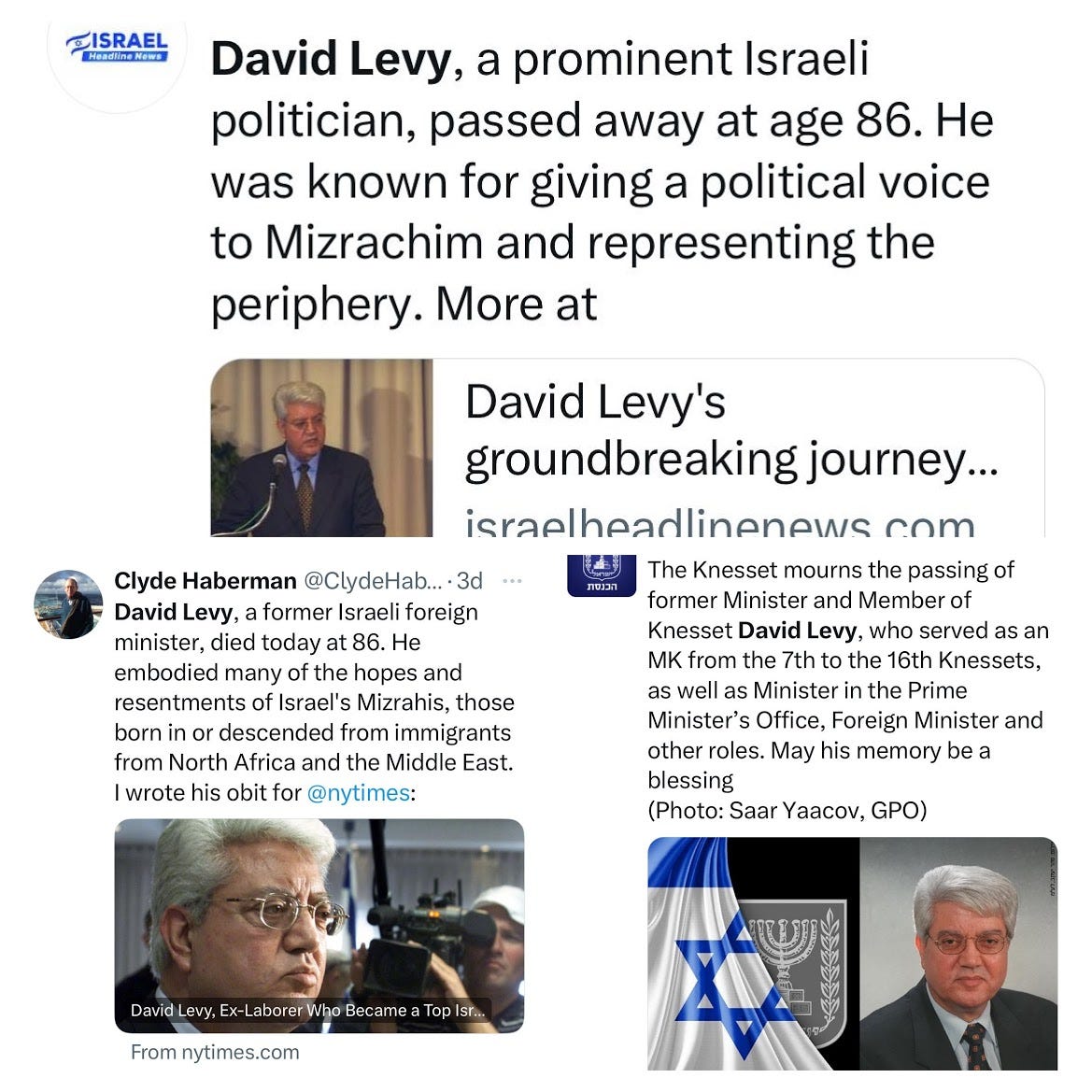Israel at War - Day 245 (eight months)
1. Hostage Deal Still Pending, Due to Both Hamas and PM Netanyahu
President Biden revealed the details in his speech last Friday of the current offer for a hostage deal with Hamas. According to President Biden, Israel agreed to a multi-phased deal, in which some hostages will be released, step by step, and in the last phase, it will end the war accompanied by the release of all remaining hostages, alive and deceased, and include the withdrawal of the Israeli army from all the territories in Gaza. After this, the Palestinians will be allowed to return to their homes in the northern part of Gaza, and it will be possible to reconstruct all infrastructure and houses in Gaza.
There is a real debate inside the Israeli government, where the extreme right partners strongly oppose any deal that involves currently halting the war. PM Netanyahu keeps announcing time and again that Israel will not stop until it attains a full victory. Meanwhile, it is unclear what the position of Hamas is towards the deal.
Recently, Israel revealed the death of someone who was listed as a hostage but was murdered on October 7th and the presence of his body in Israel was revealed. Israel further announced that four more hostages, who were also on the list of hostages, are dead. Three of them are elderly, and appeared in January in a short video released by Hamas. It is still unclear if they were killed by Israeli forces by mistake, or were murdered by Hamas intentionally.
Meanwhile, it was exposed that an Israeli ministry was using false social media accounts to reach-out to American Lawmakers to influence their opinions and make them understand that Israel is conducting a just war. This was exposed by investigations from a non-profit Israeli misinformation watchdog, FakeReporter and the New York Times.
The UN Secretary, António Guterres, announced Thursday that Israel had been listed on the black list of countries that kill children. This is bad news for the already fragile status of Israel in the international community.
2. Eleven Seriously Injured in Further Escalation in Northern Israel in the Conflict with Hizbollah
The violent conflict between Israel and the Islamic Lebanese organization Hizbollah, a proxy of Iran, reached another tipping point after eleven people were seriously injured Wednesday. Hizbollah managed to ignite wild fires all over northern Israel by using attack drones and rockets fired towards border communities. Thousands of acres were burned to ashes. More than 65,000 people were evacuated from the north right after the October 7th attack by Hamas in the south, as a precaution to avoid a similar attack by Hizbollah militants. Those people are still displaced, and have no idea when they will be able to go back home. It seems that Israel has no choice but to engage in an all out war with Hizbollah. Many defense analysts say that, due to a lack of manpower, Israel cannot simultaneously engage on two major war fronts, in the south with Gaza and in the north with Hizbollah. On the other hand, there is a conception that claims that if the war in Gaza ends, it will be easier to to reach an agreement that will distance the Hizbollah forces and their militants from the border with Israel, thereby enabling Israel to avoid another war front. Mayors of the evacuated communities claim that the government is not responding to their needs and has not provided any plans to compensate for the huge loss of revenues.
3. Israel Marks Jerusalem Day Amidst War
On Wednesday, Israel commemorated Jerusalem Day, marking 57 years since the unification of East and West Jerusalem under Israeli sovereignty in 1967. The day is marked by a Flag Parade through the city streets, culminating in a march through the alleys of the Old City and a vigil at the Western Wall.
The media reported that this year’s flag march through the streets of the Muslim quarter of the Old City was more violent and toxic than in previous years, with senior politicians such as minister of homeland security Ben Gvir (Jewish Power) announcing that it was his policy to allow Jews to pray at the Temple Mount, where the Al Aqsa Mosque is located, a holy place of worship for Muslims, to demonstrate Jewish ownership and control.
Hours before the Parade, the police urged Palestinian residents and shop owners in the Old City to close shop and remain indoors. Yet, hours before the parade launched, several journalists and peace activists were attacked by far-right Jewish youth. Hundreds of young men streamed through the Muslim Quarter, chanting "Death to Arabs" and violently attacking Palestinians, journalists and peace activists. Some also vandalized Palestinian shops.
PM Netanyahu did not attend the traditional ceremony at Ammunition Hill, a memorial site where fierce battles between Israeli and Jordanian troupes took place in the 1967 Six-Day War. According to the media, Netanyahu sought to avoid meeting an army veteran who fought in Jerusalem in 1967 and who lost his son on October 7th. Days before the ceremony, the PM’s office sought to prevent the bereaved father from reading the traditional “Yizkor” (Remember) prayer, because he wrote an op-ed highly critical of Netanyahu.
4. One of the Most Divisive Issues in Israeli Society Pending a Supreme Court Ruling
The question of equality in the army draft, is awaiting the ruling of a panel of nine Supreme Court justices. Initially, when the state was established, the founding father and the first PM David Ben Gurion agreed to free 400 Yeshiva students from the mandatory draft to the army. According to Israel law, every 18 year old, boys and girls, must be drafted to the army. Arab citizens of Israel are not drafted due to ethical and other reasons, since the direct enemies of the state are of the same national origin. Age eligible Haredi Yeshiva students, some of which were exempted when the state was established are now a draft exempt group of more than 40,000 people. The legal construction that enables their release was built on the condition that they go to Yeshiva (seminary) to study religious texts, and that they don’t go to work. In return they get a small living stipend. Over the years there were an endless number of appeals to the supreme court and other attempts to find solutions that will be agreed on by the political and Rabbinical leaders of the Haredi communities. So far there is no solution that reflects any kind of equality across different sectors of Jewish society. Now, after the current war started, the need by the army for more soldiers has became more pressing. The Supreme Court had already ruled that the state can no longer pay the living stipend allotted to the Yeshiva students. At the same time, any ruling that will enforce the draft law for Yeshiva students will not be accepted by the Haredi political parties, and may cause the government to fall. The discussion in court was live broadcast and all sides had their time in court. The state Attorney General refused to represent the government case against an equal draft, and the government had to hire a private lawyer.
5. One of Israel Most Prominent Politicians, David Levy, Dies Aged 86
Levy was the foreign minister of Israel for a few terms, and competed in the primaries for leadership of theLikud party (the party of PM Netanyahu). But he was best known as the most authentic representative of the Mizrahi (Sephardi) Jews in Israel, and the representative of what was then called “the other Israel” or the “second Israel”, meaning that section of Israeli society who immigrated from Arab countries, mainly Northern Africa’s countries, the largest sector of which came from Morocco. At the beginning of the state those communities were treated badly, they were discriminated against, were viewed as ‘primitive’, not equal to the Ashkenazi Jews who came from eastern Europe. The two communities were divided and polarized for many years. Levy was one of the prominent representatives of what was seen as the shift in perspective of the Mizrahi communities and their rising status in Israel. He lived in one of many development towns, which were built mainly to house new immigrants from northern Africa. The new immigrants were not asked where they wanted to live and were thrown into those towns which, with their lower socioeconomic status, rapidly became symbols of division and discrimination. Levy joined the Likud and served under the government of Menachem Begin. He was a rival of PM Netanyahu, but in his last years, he garnered a lot of respect for his role and accomplishments in the political sphere.
To our readers: Please note that we embed links to further details/articles behind the summaries for each item. You can see the links by their blue color and, if you are interested in further details, you can click on the link to access the relevant article/s.









